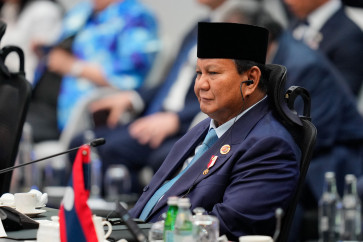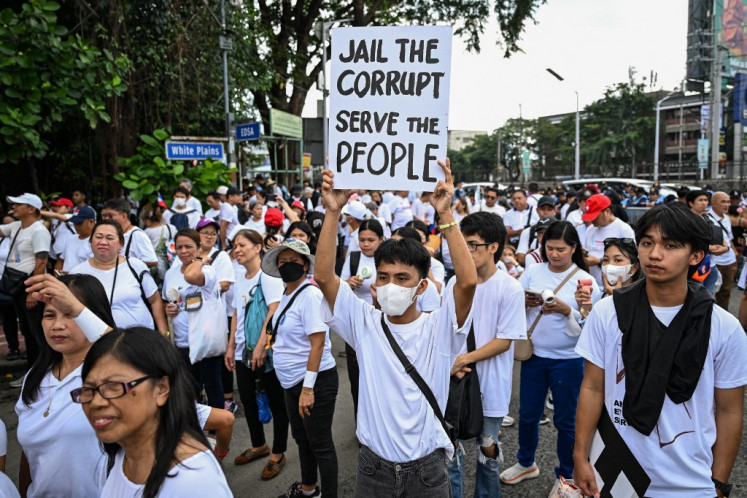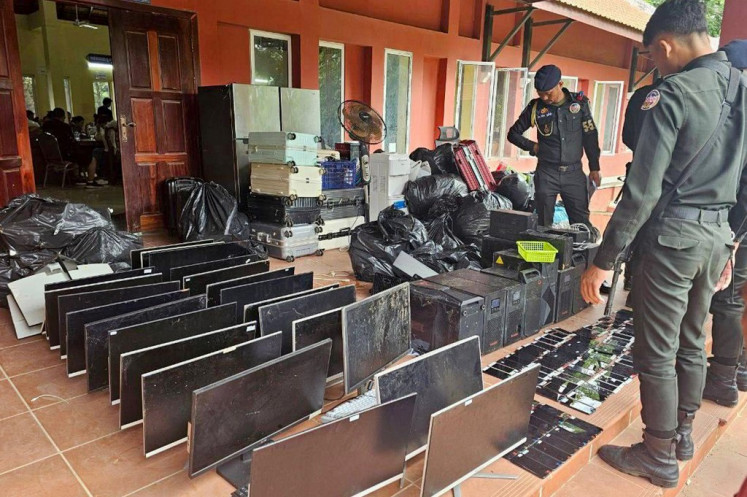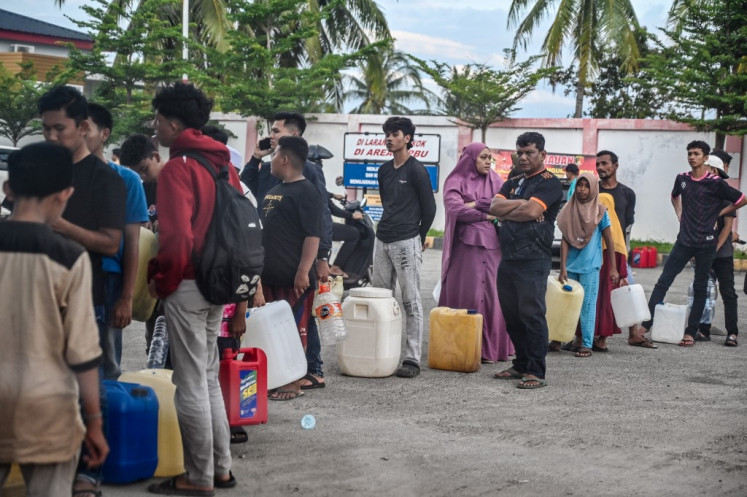Popular Reads
Top Results
Can't find what you're looking for?
View all search resultsPopular Reads
Top Results
Can't find what you're looking for?
View all search resultsQ&A: The problem with Jakarta's land reclamation
Change text size
Gift Premium Articles
to Anyone
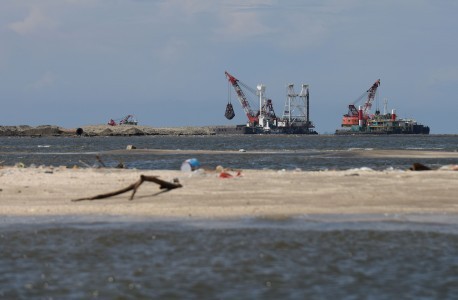 The photo take on Tuesday shows the reclamation construction activities at the Jakarta coastal area in North Jakarta. The Jakarta administration insists that reclamation project of 17 man-made islets is legal and based on existing regulations amid bribery case being handled by the Corruption Eradication Commission on the discussion of the bylaw draft of reclamation. (Antara/Wahyu Putro)
The photo take on Tuesday shows the reclamation construction activities at the Jakarta coastal area in North Jakarta. The Jakarta administration insists that reclamation project of 17 man-made islets is legal and based on existing regulations amid bribery case being handled by the Corruption Eradication Commission on the discussion of the bylaw draft of reclamation. (Antara/Wahyu Putro)
F
ollowing the controversy regarding the reclamation of Benoa Bay in Bali, now another reclamation project has become the news headlines. As a huge project off the coast of the capital city, Jakarta’s land reclamation has attracted the spotlight, particularly after the recent case of graft by the CEO of one of the project’s developers, Agung Podomoro Land.
What does ‘land reclamation’ mean?
Land reclamation refers to the activity of building more land or adding land area to a small island (or islet) or reef, making it bigger and more habitable. On a bigger scale, land reclamations result in artificial islands.
Jakarta’s land reclamation project is a project initiated by the Jakarta city administration involving the construction of 17 manmade islands on the northern coast of the city, which are being developed by private companies.
What is the objective of the project?
The current governor of Jakarta, Basuki Tjahaya Purnama, or Ahok, has repeatedly argued that the land reclamation project is needed to help Jakarta solve its land problems. Jakarta is facing threats from subsidence and rising sea levels, which combined, he says, will be far worse than Jakarta’s annual flood problem.
Subsidence refers to the gradual sinking of the city. Jakarta is sinking an average of 7.5 centimeters per year, and by up to 25 cm annually in areas near the coast, which is even faster than the rate of subsidence in Venice, Italy. Most of the sinking happens due to the massive extraction of groundwater from below the city, as Jakarta is the most populated area in Indonesia.
The land reclamation project was initially a part of the National Capital Integrated Coastal Development (NCICD) plan, more popularly known as the The Great Garuda, which aims to build a seawall to keep water out of the city and to help slow subsidence. However, the land reclamation project was taken over by the Jakarta city administration and environmental experts, including the deputy director of the Indonesian Forum for the Environment (Walhi), have stated that the land reclamation itself will not help the subsidence problem.
What is the problem with the land reclamation project?
As the project builds at least 17 artificial islands with a projected total area as big as Bogor, it will significantly alter and degrade the already fragile environment of coastal Jakarta. The presence of artificial islands will change sea currents, which can lead to the erosion of nearby natural islands or even more flooding of the city. Fishermen have protested, saying that the project will affect their catch, and that they will have to go further out to sea to fish, increasing their gasoline expenses.
The environmental impacts of the Great Garuda Wall, a separate but related project, will be even more drastic. When finished, the waters inside the wall will lose its salinity, changing the sea into freshwater. Many species will have to migrate outside the wall and the mangrove forest in northern Jakarta will disappear.
The project also clashes with other construction projects and existing infrastructure. The Transportation Ministry's Tanjung Priok Port Authority representative said that the land reclamation would hamper the passage of ships in and out of ports, and there are a number of seaports along the north coast, including Muara Angke, Sunda Kelapa, Tanjung Priok and Marunda.
The Indonesian Association of Submarine Communications Cable Systems representative warned that many telecommunications cables were located under a number of the planned islets. An accident could lead to the disruption of communications.
The fisheries and marine affairs minister has asked the city to delay the project, and later stated that the project required permission from the ministry since it affected the marine environment. Governor Ahok, however, argued that there should be no problem with the permit since the authority of the Jakarta governor was on the same level as that of a minister.
Most important is the effectiveness of the project itself in preventing subsidence. Environmental experts argue that the land reclamation will not help the subsidence problem. One NCICD consultant even stated that stopping groundwater extraction alone would stop the sinking within a decade.
What is Ahok’s position on this?
In response to the protest by local fishermen, Ahok stated that the fishermen had been “politicized”. Ahok also claimed that criticism of the project was merely a political attack to discredit him, as he has repeatedly been a target of critics since he took office.
Who will actually benefit from the project?
The developers, of course. The artificial islands are set to host luxurious real estate and golf courses, accessible only for those of higher income as the properties are being sold for Rp 30 million (US$2,200) per square meter.
Deputy governor for spatial planning and the environment stated that 30 percent of the reclaimed land area would be green area, and there would be housing provided for low-income residents. However, at Golf City for example, the planned low-cost rental apartments are only intended to house workers to support the wealthier community. Urban experts have expressed concern about whether the project will benefit the public at large or just the high-income residents of the gated community.
What about the graft case?
KPK investigators recently arrested Jakarta city councilor Mohamad Sanusi of the Gerindra Party and another suspect, identified as Geri, at a shopping mall in South Jakarta. Both of them received money from an employee of PT Agung Podomoro Land (APLN) that was intended to purchase the councilors’ support during the City Council’s drafting of a bylaw on zoning of coastal areas and small islands. Based on the bylaw, the company has to hand over 15 percent of the reclaimed land to the city administration. The bribe was intended to change that requirement to 5 percent. PT Agung Podomoro Land president director Ariesman Widjaja has been named a corruption suspect also.
An analyst from KDB Daewoo Securities Indonesia stated that Agung Podomoro Land owned much less land from the project than its competitors. In 2015, Agung Podomoro Land owned around 1,000 hectares, while PT Ciputra Development and PT Bumi Serpong Damai owned 4,000 ha and 6,000 ha, respectively. This lack of land makes the reclamation project crucial for Agung Podomoro Land.
Ahok stated that he would never agree to reduce the requirement, since it was based on expert advice. A document carrying the governor’s handwriting has been circulated on the internet, where Ahok appears to comment that a new requirement of 5 percent being based on an agreement between the governor and developers is “crazy” and “may lead to corruption”.
So what is the problem?
The problem lies in the possibility that the land reclamation does not help Jakarta’s subsidence problem – and that it will even lead to other environmental problems – and that the land will mainly be used by higher-income citizens instead of benefiting the public at large. The recent graft case reflects the tendency of developers to exploit land for private benefit instead of the public’s, fueling criticism of the project.



